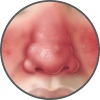About Psoriasis
About Psoriasis
WHAT IS PSORIASIS?
Psoriasis is a common but chronic skin condition that causes
inflammation and scaling (red elevated patches and flaking silvery
scales). The patches can be itchy or sore, causing discomfort and pain.
Psoriasis causes skin cells to rise to the surface and shed at a very
rapid rate. On average, people with psoriasis shed their skin cells
every 3 to 4 days, while people without the condition have a turnover
rate of about every 30 days.1,2,3,4
- Read more about About Psoriasis
- Log in or register to post comments



 Human skin is covered in hundreds of thousands of microscopic hair follicles, called pores. These are particularly prominent on the face, neck, back, and chest. These pores are connected to oil glands under the skin that make a substance called sebum. Sometimes these follicles produce too many cells and become blocked. As a result, sebum (oil) gets trapped and bacteria (P. acnes) begin to grow.1,2,4
Human skin is covered in hundreds of thousands of microscopic hair follicles, called pores. These are particularly prominent on the face, neck, back, and chest. These pores are connected to oil glands under the skin that make a substance called sebum. Sometimes these follicles produce too many cells and become blocked. As a result, sebum (oil) gets trapped and bacteria (P. acnes) begin to grow.1,2,4 Treatment for acne has several goals: to heal pimples, to prevent pimples (by decreasing sebum production, killing bacteria, and normalizing skin shedding), and to prevent scarring.1,6
Treatment for acne has several goals: to heal pimples, to prevent pimples (by decreasing sebum production, killing bacteria, and normalizing skin shedding), and to prevent scarring.1,6